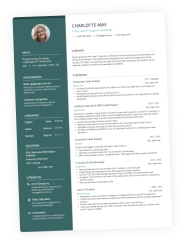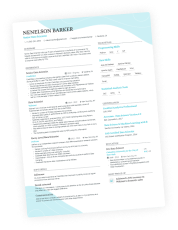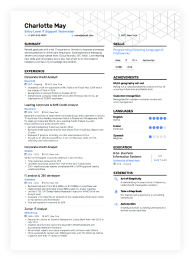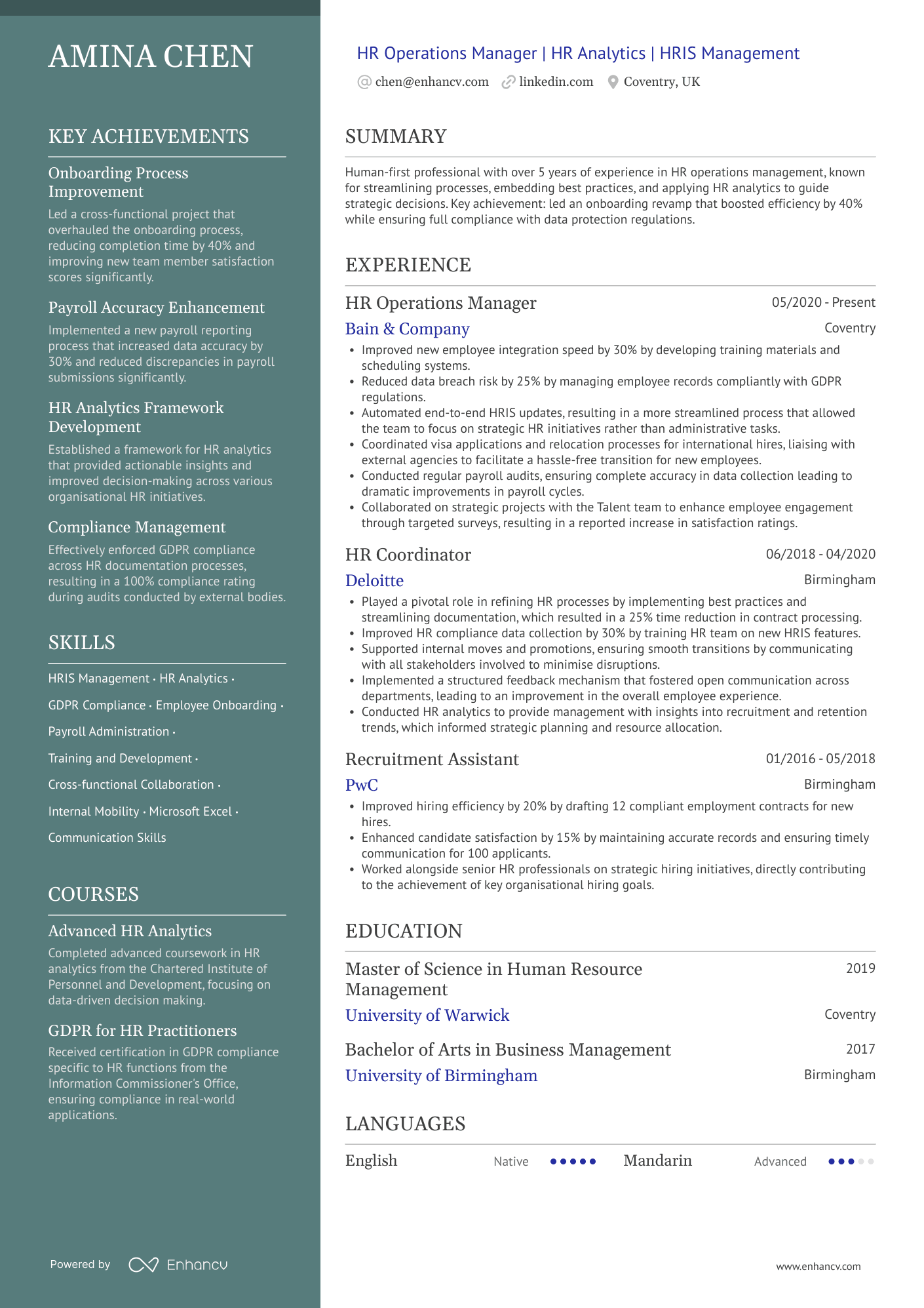The work experience section on a CV is often the first thing a hiring manager looks at, so it needs to be spot on. But knowing exactly what to include (and what to leave out) can be tricky. Should you list every job? How much detail is too much?
This guide breaks it down for you. You’ll learn how to write work experience entries that show off your skills, back them up with results, and match what employers are actually looking for—no guesswork needed.
Key takeaways
- Always list your work experience in reverse chronological order, starting with your most recent role.
- For each position, include the job title, company name, location, and the dates you worked there.
- Use bullet points to clearly outline your main achievements and responsibilities.
- Start each bullet point with a strong action verb to make your contributions stand out.
- Wherever possible, back up your accomplishments with numbers or tangible results to show real impact.
Let’s begin by looking at what exactly we are trying to craft.
What is a CV work experience section?
A CV work experience section is a detailed list of your previous roles, responsibilities and achievements that show your suitability for the job you’re applying for.
If there’s one CV section hiring managers never skip, it’s this one. This is where they look to understand what you’ve actually done, how you’ve done it and what kind of impact you've had.
The work history segment is your chance to show the value you’ve added in each role, whether paid or unpaid. That includes full-time jobs, part-time roles, internships, volunteer placements, freelance gigs—any position where you’ve used and developed your skills in a real-world setting.
What counts as experience on a CV?
Anything that shows you’ve used your skills, taken initiative, or contributed to something beyond yourself can count as experience.
This might come from internships, personal projects, caring responsibilities, or even school activities. If you’ve learnt, solved problems, or worked with others, it’s worth adding. The key is to show real outcomes and connect your experience to what the employer actually needs.
Experience is not what happens to you; it's what you do with what happens to you.
What to include in the work experience section of your CV
Your work experience section should feature the roles that best align with the job you're targeting. That doesn't mean listing every job you've ever had—just the ones that show you're a strong fit for this specific role.
Once you’ve decided which positions to include, focus on presenting them clearly, with concise entries that are easy for recruiters to scan.
What should each work experience entry include?
- Job title: Keep it clear and accurate. Wherever possible, match the phrasing to the job advert you’re targeting.
- Company name and location: Include the name of the organisation and the city or town. No need for a full address.
- Dates of employment: List the month and year (e.g. June 2022 – Present). Leave out exact days unless specifically requested.
- A short job description (optional): One or two brief sentences outlining your role in the company or what the business does—especially helpful if it’s a startup or operates in a niche sector.
- Three to five bullet points highlighting key responsibilities and achievements: Focus on what you actually did, keeping each point clear, relevant, and tailored to the role you’re applying for.
- Quantified accomplishments: Wherever possible, include results with numbers. Did you cut costs, grow revenue, speed up a process? Show the impact you made.
- Skills used or developed: Mention the tools, techniques or soft skills you applied in context. Rather than vague claims, tie them to real tasks or outcomes.
In a modern CV, it’s best to start each bullet point with a strong action verb. Words like launched, streamlined, delivered, or supported help bring your experience to life and show that you played an active role, rather than simply going through the motions.
How to format your work experience (with template)
А well-formatted experience section not only looks clean—it makes it easier for recruiters to spot the information they care about most. Think of it as a mini case study for each role: what you did, how you did it, and why it mattered.
Here’s a simple structure to follow:
Work experience entry template
[Job Title]
[Company Name], [Location]
[Start Date] – [End Date]
Short description of the role (optional – one to two lines)
• Bullet point #1 – your main responsibility or contribution
• Bullet point #2 – an achievement or result, ideally with numbers
• Bullet point #3 – something that shows transferable skills or initiative
• (Optional) Bullet point #4–5 – additional wins or measurable impact
Below is an example of a well-written CTO work experience section, created using Enhancv’s AI-powered CV builder:
- •Spearheaded the development of a fully customisable e-commerce platform, enabling a 5x increase in online sales and supporting 30% YoY revenue growth.
- •Built and led the tech strategy that positioned Taylor & Hart as a leader in bespoke digital jewellery, contributing to a 40% rise in customer acquisition at reduced CAC.
- •Integrated scalable infrastructure and CRM systems, streamlining operations and improving order fulfilment speed by 25% across global markets.
- •Played a key role in investor relations and strategic fundraising initiatives, contributing to a successful £X seed/Series A round and long-term technology roadmap alignment.
Now that you’ve seen what a strong CV experience entry looks like, let’s take a step back and look at where this section belongs and why its placement on your CV makes such a difference.
Where to list work experience on your CV and why it matters
Your experience section usually comes just below your summary statement and key skills —especially if you're following the traditional reverse chronological CV format. That means starting with your most recent job and working backwards, making it easy for employers to see your career progression at a glance.
Why? Because recruiters want to see your most recent experience first, and applicant tracking systems (ATS) are typically designed to scan CVs in this traditional order. It makes your career story easier to follow for both hiring managers and software.
Where you place your experience section can shape the entire structure of your CV.
Here’s how it works across the three main CV formats:
| CV format | Work experience placement | Best for | What it communicates |
|---|---|---|---|
| Reverse chronological CV | Just below your summary or objective statement | Candidates with a solid, continuous work history in a similar field | “My experience speaks for itself.” It emphasises stability, growth, and recent achievements. |
| Combination (hybrid) CV | After a strong skills or achievements section | Career changers, multi-skilled professionals, or those with varied roles | “Here’s what I bring to the table.” It reframes your background and focuses attention on relevance first. |
| Skills-based (functional) CV | Below thematic skill groupings (or near the end) | People with limited experience, long gaps, or returning to work | “Focus on what I can do, not where I’ve done it.” It shifts emphasis from job titles to capabilities. |
Once you’ve figured out where to place your work experience and how to format it, one question often comes up:
How far back should you go when listing work experience?
As a general rule, your CV should cover the last 10 to 15 years of your career. This strikes the right balance between showing relevant career steps and keeping things concise. Recruiters rarely need to see every job you've ever had—especially if the older ones aren't directly related to the role you're applying for.
Focus on quality over quantity. Two or three well-explained roles that clearly show your impact are far more effective than a long list of unrelated jobs. If you held a position more than 15 years ago that’s highly relevant, you can still include it, but there’s no need to go into too much detail.
PRO TIP
Use more bullet points for recent roles (around four to six) and fewer for older ones (two or three). The closer the job is to today, the more weight it carries—so give it the space it deserves. Older roles should support your story, not dominate the page.
Here’s what a modern UK CV looks like when the experience section is right where recruiters expect it —directly beneath the summary.
Now, onto the practical part of the guide—writing your experience section so it makes sense to employers.
How to tailor your work experience to a job ad
Aligning your CV to each specific job you’re applying for is essential. Hiring managers aren’t looking for a one-size-fits-all document. They want to see clear evidence that you understand the role and can bring what they’re looking for.
If your CV feels too generic or misses the mark, it’s likely to be passed over—even if you’re more than qualified. This applies across your entire application, but it’s especially crucial in the work experience section.
A well-targeted experience section does three key things:
- Speaks directly to the job description by mirroring its language.
- Spotlights your most relevant experience.
- Cuts anything that doesn’t serve your application.
Let’s take a look at the job ad below and explore how to shape your work experience to match it.
Junior Software Developer
We’re looking for a Junior Software Developer to join our team at IMP Software. Software Developers work on cross-functional teams to deliver solutions such as IMP Planner and ICFP.
The successful candidate will be a collaborative developer, who takes pride not just in the pragmatism of their solutions, but the quality of their code.
We are looking for someone who prioritises creative problem solving, structured logical thinking, has a baseline fluency in code and recognises the importance of working in a close-knit squad.
Agile Software Development
- Design, develop, and test software solutions in our tech stack including ASP.Net, MVC, C#, SQL.
- Collaborate with a team of peers, applying agile practices such as pair programming and code reviews.
- Participate in agile ceremonies such as planning and refinement.
- Collaborate with product, development, and test specialists to model solutions for development.
- Participate in exploratory work such as spikes to explore new technology, patterns, and opportunities.
- Diagnose and resolve third-line support issues.
Software Design
- Develop to maintainability standards.
- Develop to security standards.
- Develop to agreed data access patterns, including Entity Framework and migrations.
Skills & Attributes:
- ASP.NET Core MVC, C#
- SQL and Entity Framework
Above, you see key terms from the job description highlighted—these are the keywords the candidate should aim to naturally incorporate into their experience section.
First, let’s look at an example that misses the mark:
- •Helped with software projects and bug fixes.
- •Wrote code and worked on general updates.
- •Attended team meetings and provided input.
- •Used various programming languages as needed.
- •Gained experience working in an office environment.
Here’s why this entry fails to impress:
- Vague bullet points with no mention of the tech stack or agile practices.
- Doesn’t reflect any keywords or responsibilities from the job ad.
- No impact, problem-solving, or collaboration demonstrated.
- Uses generic phrases like “helped” and “worked on” without substance.
Now, look at how a junior software developer might turn this into a success story:
- •Developed and tested internal tools using ASP.NET Core MVC and C#, contributing to a 15% reduction in manual admin tasks for the operations team.
- •Participated in planning and code reviews, improving delivery predictability across two agile sprints.
- •Wrote SQL queries and maintained Entity Framework migrations, helping to stabilise internal reporting features used by five departments.
- •Contributed to exploratory spikes that informed the adoption of a new logging framework now used across three projects.
- •Prioritised clean, maintainable code that met internal security and quality benchmarks, with no critical issues flagged in QA reviews.
This version shows exactly how a junior developer can make their experience stand out—even early in their career.
- It reflects the job description closely, using key terms like ASP.NET Core MVC, Entity Framework, agile, and spikes.
- The bullet points go beyond listing tasks—they show the why and what came of it, even in small ways.
- Measurable outcomes (e.g., “15% reduction,” “used by five departments”) add credibility without sounding overblown.
- Collaboration and coding standards are clearly addressed, showing the candidate fits both the technical and team-oriented side of the role.
- The writing is concise and consistent, making it easy to scan while still packing in useful detail.
PRO TIP
Prioritise work experience that aligns closely with the job you're applying for, highlighting roles where you've developed relevant skills or achieved significant accomplishments. This targeted approach demonstrates your suitability and potential value to prospective employers.
How to decide what experience is relevant and what isn’t
Knowing which experience to include on your CV starts with one simple rule: align your past roles and achievements with what the job description is asking for.
Here’s how to tailor your CV effectively:
- Study the job description carefully: Read through the listing and highlight the key skills, experience, and qualifications they’re after. These are your best clues to what the employer values most.
- Match your experience to their needs: Review your own work history and pick out roles or projects that closely reflect what’s in the job ad. Focus on examples where you’ve applied the same skills or delivered similar outcomes.
- Highlight transferable skills: Even if you haven’t worked in the same industry, experience that shows leadership, problem-solving, or collaboration can still be highly relevant. Think about what the role demands, not just where it happens.
- Use keywords from the job description: Weave in the same language they use, especially when it comes to tools, soft skills, or technical terms. This helps your CV pass through ATS and reassures hiring managers you’re speaking their language.
- Be selective, not exhaustive: You don’t need to include every job you’ve ever had. Prioritise the roles that show you’re well-suited to this opportunity, and leave out anything that doesn’t add real value.
A tailored CV shows employers that you’ve taken the time to understand the role and that you’re already thinking like someone who belongs on the team.
How to handle gaps in work history on a CV
Employment gaps aren’t the red flag they used to be—but how you handle them on your CV still matters.
Here’s how to approach them strategically:
Experience sections with employment gaps
- Don’t draw attention to the gap: You don’t need to lie or overexplain a career gap, but don’t leave it hanging either. Use the space to highlight any new skills, projects, or experiences you picked up during that time.
- Consider a different CV format: Try a hybrid or functional CV. These formats bring your skills and achievements to the top, rather than focusing on a strict timeline—ideal if you want to shift attention away from gaps.
- Include relevant non-traditional experience: Did you freelance, volunteer, study, or work on personal projects during that time? Treat those like proper experience entries, focusing on what you did and the skills you used.
- Address the gap (if needed) in your cover letter: A brief note in your cover letter can add helpful context without taking up space on your CV. Keep it positive, relevant, and focused on what you’re ready to do next.
- Be prepared to talk about it in interviews: Have a short, honest explanation ready. Something simple like: "I took time off for personal reasons and used the opportunity to upskill. Now I’m ready to rejoin the workforce with fresh perspective."
The same goes for anyone with little or no formal work experience. You can still include an experience section—just label it differently. Spotlight achievements from extracurriculars, volunteering, or one-off projects. It’s all about showing what you’ve done and what it says about your potential.
Sometimes life experience gives you the maturity and confidence that no job ever could. Stay-at-home parents, for instance, bring a whole range of skills into a new role. So don’t stress about the experience itself—focus on how you frame it. Be bold with your wording and tell the story where you’re the hero.
5 final tips for writing a strong work experience section on your CV
Let’s wrap up everything you need to know about crafting a powerful CV that puts your experience in the best light:
Choose a clean, well-structured template
A clear, professional layout can make all the difference and that’s exactly what Enhancv’s CV Builder is designed to deliver. Our templates help you structure your experience section so it’s easy to scan and highlight your achievements at a glance. With clean headings and a logical flow, we make it simple to present your career story in a way that feels both polished and personal.
Focus on what the employer is actually looking for
Tailor your experience section to match the job description. Highlight roles and responsibilities that align with the role you're applying for, and mirror the language used in the ad where it makes sense. This shows that you're not just qualified—you're paying attention.
Keep it concise and relevant
Avoid overloading each entry with too much detail. Stick to a few key bullet points per role, focusing—ideally backed by numbers or outcomes. Clarity and relevance are more effective than sheer volume.
Double-check for errors
Always proofread your CV for grammar, spelling, and formatting issues—they may seem small, but they can cost you an interview.
Enhancv’s CV Checker reviews your document across 16 key categories, from ATS compatibility to tone, structure, and style. It’s like having a second pair of expert eyes, helping you catch what recruiters will notice. An error-free, well-optimised CV shows you care about the details and that’s something every employer values.
Is your CV good enough?
Drop your CV here or choose a file. PDF & DOCX only. Max 2MB file size.
Refresh your CV regularly
Even if you’re not actively job hunting, it’s smart to keep your CV up to date. Adding new projects, skills, or achievements while they’re still fresh helps ensure nothing important gets forgotten—and you’ll be ready when the right opportunity comes along.
Frequently asked questions on CV experience sections
Here are some quick answers to help you make your CV experience section truly work for you:
How do I make my work experience section stand out?
Employers aren’t just scanning for tasks—they’re looking for signs that you understand the role and can deliver real value. The best way to stand out is to mirror the job description and tailor your experience accordingly. Use action verbs that show initiative, and back up your claims with tangible results. Every bullet point should offer proof that you can do what the role requires—not just in theory, but in practice.
What’s the best way to format dates in a CV for ATS?
Stick to the “Month Year – Month Year” format (e.g. June 2021 – March 2023). It’s clean, standard, and easy for applicant tracking systems to parse.
Do I need to include all of my previous jobs on my CV?
No, only list roles that are relevant to the job you’re applying for. Quality always beats quantity, especially if older roles don’t support your current goals.
Can I add volunteering in the work experience section of my CV?
Absolutely. If it’s relevant and helped you build transferable skills, list it just like a job—especially if you’re early in your career or filling a gap.
Should internships go in the work experience section of a CV?
Yes, internships count as real experience. Structure them like any other role, focusing on what you contributed, what you learned, and the impact you made.
Conclusion
Now that you’ve got the tools, structure, and language to shape a standout CV experience section, it’s time to turn the blank page into your strongest asset.
Whether you’re showcasing steady growth, shifting careers, or filling in the blanks with real-life wins, your experience tells a story—so make it count. Choose your words with purpose, format with care, and don’t be afraid to show what makes your journey worth reading.




